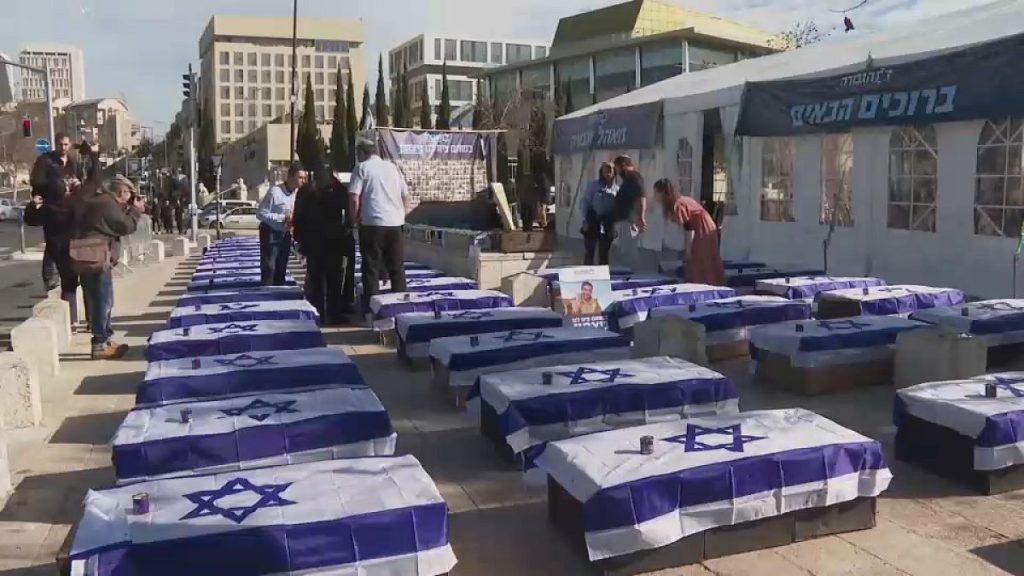The protracted and devastating conflict between Israel and Hamas, spanning over fifteen months, has yielded a fragile and contentious ceasefire agreement, prompting a mixture of jubilation and profound apprehension across the globe. While international mediators celebrated the prospect of an end to the relentless violence, the agreement has ignited a firestorm of controversy within Israel, particularly among the families of fallen soldiers. Their anguish and opposition stem from a critical provision within the deal: the exclusion of approximately seventy Israeli hostages held captive within the Gaza Strip. This omission has transformed the proposed ceasefire into a source of renewed heartbreak and outrage for those who have already sacrificed so much in the conflict.
The ceasefire agreement, meticulously brokered by key international players, represents a complex and multifaceted attempt to address the core issues fueling the enduring conflict. Its central tenets encompass a cessation of hostilities, the release of Israeli hostages held by Hamas, and a framework for addressing the underlying political and humanitarian crises that have plagued the region for decades. However, the last-minute refusal by Israeli Prime Minister Benjamin Netanyahu to ratify the agreement has plunged the situation into further uncertainty, leaving the fate of both the hostages and the broader peace process hanging precariously in the balance. Netanyahu’s justification for this dramatic reversal centers on accusations that Hamas has failed to uphold its commitments within the agreement, specifically regarding the release of all Israeli hostages.
The families of the captured soldiers and civilians find themselves at the heart of this agonizing dilemma. For them, the proposed ceasefire is not a symbol of hope but rather a painful reminder of the loved ones they fear will be abandoned and forgotten. Their opposition is rooted in a deep sense of betrayal and a conviction that the agreement prioritizes political expediency over the fundamental human right to freedom. They argue that acceding to a ceasefire without securing the release of all hostages would be a moral failure of the highest order, a concession that would embolden Hamas and undermine the very principles for which their loved ones fought and died. Their desperate pleas for the inclusion of the hostages in any ceasefire agreement have resonated deeply within Israeli society, sparking a national debate on the moral and strategic implications of the proposed deal.
The unfolding crisis has also exposed the deep divisions within Israeli society regarding the appropriate response to the ongoing conflict with Hamas. While some segments of the population view the ceasefire as a necessary step towards de-escalation and a path, however tenuous, towards lasting peace, others see it as a capitulation to terrorism and a betrayal of the nation’s security interests. This internal struggle reflects the profound complexities of the Israeli-Palestinian conflict, a conflict that has claimed countless lives and defied all attempts at a lasting resolution. The fate of the hostages has become a focal point for these competing perspectives, highlighting the agonizing choices faced by Israeli leadership and the profound human cost of the conflict.
The international community, deeply invested in the prospect of a resolution to the conflict, faces the daunting challenge of navigating the intricate web of political and humanitarian considerations surrounding the ceasefire. Mediators are working tirelessly to bridge the divide between Israel and Hamas, seeking to address the concerns of both sides while upholding the fundamental principles of international law and human rights. The release of all hostages is universally recognized as a non-negotiable imperative, a moral obligation that transcends political maneuvering and strategic calculations. However, achieving this objective requires a delicate balancing act, one that demands both firmness and sensitivity in dealing with the competing demands of the parties involved.
The future of the ceasefire agreement, and indeed the prospects for a lasting peace in the region, remain profoundly uncertain. The fate of the hostages hangs in the balance, their families enduring an agonizing wait for news of their loved ones. The international community continues to exert pressure on both Israel and Hamas, urging them to uphold their commitments and to prioritize the humanitarian imperative of releasing all captives. The coming days and weeks will be critical, a period of intense negotiations and delicate diplomacy that will determine whether the fragile hope for peace will blossom or wither in the face of continued conflict and human suffering.














